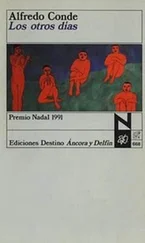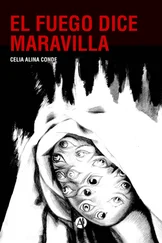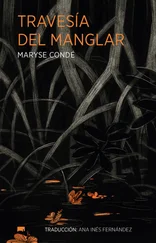He had gone inside the church without really knowing what he was doing and fallen on his knees in front of the statue of Saint Anthony of Padua, a saint he loathed, with his tonsure, his missal, and his silly expression. For the first time in his life he was shaking with fright, as helpless as a child!
Poor Mavundo! Since learning of Madeska’s death, he had gone to a lot of trouble. He had worn out his dwarves. Now he was giving Agénor wangas, potions, powders, unguents, and lotions of his own making. He lit candles in a circle around him. He made scarifications in the fleshy parts of his arms and thighs and inserted amulets. He whirled around and drew circles in the undergrowth. Agénor looked at him in pity. He knew full well all this agitation was a waste of time. His days were numbered. When the mischief maker had finished aping around, Agénor paid him generously and climbed back onto his horse. Delighted at leaving, the animal, now with wings on its hooves, flew through Grande-Anse and galloped without stopping until they reached the Fouques-Timbert plantation. On leaving La Regrettée, Agénor did not notice the flock of egrets scatter in a commotion behind Colibri’s rump. He did not realize that what had scared them was another bird, attired in black plumage like a frigate bird or a buzzard. During the conversation between Mavundo and Agénor it had kept its distance, perched motionless on the branch of a guava tree, observing the scene with its cruel, round eyes. Once the conversation was over, it had taken flight, following Agénor and Colibri from afar, its wings spread wide like the arms of Christ on the cross.
When Agénor arrived home, the bird wheeled around for some time above the estate, as if it were deciding on where to settle. Then it made up its mind, swooped down on a magnificent mahogany tree, and nestled among its shiny leaves.
4
Every Sunday at three in the afternoon, the fatal hour of the death of Our Lord Jesus Christ, the same scene never failed to occur. Zuléfi, Madeska’s eldest son, his tall body draped in a white robe, took up his position on the seafront. Behind him, the crumpled fabric of the waves and the silhouette of the ships leaving for Veracruz. Above his head, the yellow eye of the sun that seemed to mock his antics. A few feet away, Hosanna, his wife, and their six children, dressed in the same white, rang their bells and harangued the tired, poor, and huddled masses, who were convinced there was a curse on the black race, to draw closer to the Master’s Envoy. Oh, yes! The black race had suffered in the holds of the slave ships. It had suffered in the sugarcane plantations. Its blood had reddened the earth. Its sweat had drenched it. First and second slave emancipations alike had changed nothing. They were still eating out of the same bowl of misery. And they would continue to do so. And for what reason? Because they were paying for unspeakable crimes, vile and horrible acts, acquired while they were in Africa and perpetuated in Guadeloupe — human sacrifices, fornication with animals, and depravity of all sorts. But those who reasoned along these lines, preached Zuléfi, were not entirely within reason. The Good Lord knows no curse. God forgives. He forgives everyone, even those who are black of skin, vile, and crouching in the gutter. If they learned to ask for forgiveness, the black race would be rewarded with a wondrous thing. In the afterlife they would be equal among nations.
Difficult as it may seem to believe, this sermon had a considerable following. As early as Saturday morning folk from La Pointe crowded onto the bridge leading out of town, and the procession set off in the direction of Basse-Terre. Crowds poured in from the Leeward Coast, from Deshaies, Vieux-Habitants, even Sainte-Rose, plus a few fanatics from the Grand Cul-de-Sac. By noon the seafront in Basse-Terre was swarming with people: women and more women, but also men, even teenagers. While they waited, they sang psalms, some sitting on the ground or small benches, others standing, drawing themselves up to their full height. The more the priests thundered from their pulpits against Zuléfi, the more the politicians scoffed at his “naive rhetoric,” the more the crowds kept coming. After the sermon in Creole, which usually lasted two good hours, Hosanna and the children passed around the small wicker baskets for people to give what they could — from brand-new bills to penny coins. Then came the solemn moment of communion. Zuléfi asked the Good Lord to fill the bread twists with His presence before handing them out. Every time there was an incredible commotion. There was never enough to go around. People elbowed their way through the crowd, clawing and fighting like the possessed, and one wondered why the Good Lord did not simply repeat the miracle of Canaan and the multiplication of the loaves.
That Sunday, the three o’clock sun was especially harsh. The worshippers sheltered as best they could under parasols, bakoua hats, pieces of toweling, and jute sacks. Now that the hurricane season was over, the experts predicted a volcanic eruption, given the baking heat. Folk who slept on the volcano’s slopes had been woken by rumbling noises. Up by the Yellow Baths, it stank of sulfur. Ashes had blackened the bed of the river Galion. Zuléfi himself dripped great drops of sweat. Though he looked as if he were lost in prayer, he was watching every movement among the crowd and could have described every one of his congregation. When he saw Matthieu arrive, he was not surprised. He had been expecting this visit for the past twenty-five years. He knew that one day some smart police officer would think of interrogating him, now that his father was gone. Yet so convinced he was of divine indulgence, he was not scared of mortals. Matthieu’s impeccable behavior never betrayed the real reason why he was present. Like everyone else, he knelt down in the scorching sand. Like everyone else, he sang the psalms. During the sermon he devoutly placed his head between his two hands. He struck his breast twice as hard demanding the Lord’s forgiveness. However, he did not budge for communion and merely watched as his fellow disciples filled themselves with the presence of God. As the crowd dispersed, he stood up, dutifully made the sign of the cross, then walked over to Zuléfi with a look that meant, Now it’s our turn.
Zuléfi had often imagined this moment when he would be able to get this weight off his chest and confess.

“Who put you onto me? You must have been surprised that I, the child of a mischief maker, raised amid vice and magic, suddenly took refuge in the Good Lord. You want to know why?
“Because one day the scales fell from my eyes like Saul on the road to Damascus. The stench of my sins and those of my father grabbed my nostrils. I can’t tell you which smelled the worst. All I know are those that wake me up in the middle of the night. I, Zuléfi, committed the mother of atrocities — I performed human sacrifices. It’s no use telling me I was still a little boy. I was twelve. I understood perfectly well what I was doing. And to be honest with you, I had already dabbled in the waters of women. My father’s ancestor landed here in 1640. He came from the kingdom of Abomey. He was a Yavogou from a noble family and one of the court’s highest dignitaries. The Yavogous are not merely princes. They can see and talk with the spirits, like I’m talking to you at this very minute. The invisible world holds no secrets from them. That’s why they alone perform the supreme sacrifice — the human sacrifice. When it comes to the annual celebrations and royal funerals, they are the ones who decide how many widows, slaves, virgins, and albinos must be sacrificed. On the death of a member of the royal family, they decide who must follow them to the grave. Once the sacrifices are over, as guardians of the spirit world, they knead the earth around the shrines with fresh blood. You can imagine that, coming from a tradition like that, my father wasn’t going to break his back under the sun cutting sugarcane. He used his powers to turn the heads of the Fouques-Timbert family. Fair’s fair. He helped them become the most powerful family of planters. In exchange, he and his family were virtually free.
Читать дальше













